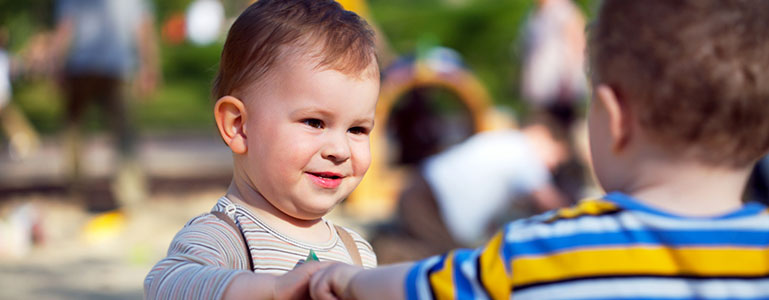The preschool years are a time when young children begin to develop deeper friendships with peers. This is the age of the first “BFFs” (Best Friends Forever), when children gravitate toward peers who share similar interests or play styles. Preferences emerge within the preschool classroom, and jealousy may arise when a best buddy wants to play with someone else.
Friendships are whimsical at this age. Best friends on Monday can be fighting mightily by Wednesday, then ready for a playdate with this same friend over the weekend. It is the age of “frenemies” and exclusionary play, when parents might hear common phrases like, “You can’t come to my birthday party,” a terrible fate for a 4-year old.
As such, the preschool years are the ideal time to focus on developing and deepening social skills. Children need to learn to manage the big feelings that well up when navigating friendships, and they need specific conflict resolution strategies that encourage problem-solving and promote awareness of the experiences of others.
To learn these skills, children need to practice … a lot. Parents and teachers need to provide play experiences in which children might struggle, and support them as they learn the tools to negotiate the difficult social situations that arise. Here are five tips for building and nurturing social skills in young children.
- Validate children’s feelings and experiences. “Something important is going on here,” is usually a nice entry into the world of children’s conflicts, because it assures them that you won’t minimize their struggle.
- Help children become comfortable with conflict by not rushing to solve their problems. State the problem as best you can and revise the statement based on the children’s narrative. Something like, “The tower you were working on has fallen down and you (or your friend) look upset.”
- Brainstorm some possible solutions, if needed. Begin with an open-ended prompt like, “Hmmm. I’m not sure how to solve this problem. What do you think?” The less competent you are, the more capable the children can become.
- Choose a way forward. Make sure there is buy-in from both children. For example, “Your friend suggests we re-build the tower. What do you think?”
- Later, evaluate how it went. “Wow, you both agreed to use the timer to end the turn, but it’s still hard to share. We may need a different solution. Do you have another idea?”
Problem-solving skills may need to wait until the children have calmed down if one of them (or both of them) has experienced deep emotion around the conflict. Having a cool-off moment, introducing a snack time, and redirecting to another activity can be a way to help children unwind. Be sure to revisit the previous activity when everyone is feeling better, and set the ground rules before the play begins again. For example, “Maybe when you’re ready to knock the tower over, check in with each other and count to 3 together!”
It can be challenging to observe children struggle with friendships. As a caring, loving parent or teacher, we prefer that children don’t struggle or fight with their friends. The value of struggle, however, is that children learn to be persistent and resilient. Be a good listener, reflect and validate the experiences of your child, and prompt them to brainstorm when ready. In this way, we encourage children to build social skills that allow them to navigate the ups and downs of friendships, which, as we know, is a life-long journey.
If you are seeking additional support to help your child manage social skills or other challenges, please reach out to Parents Place. Seeking other resources to help your child thrive? Attend a workshop, schedule a parent education meeting, or schedule an assessment with one of the Child and Adolescent Specialists at Parents Place.
By Heidi Emberling, EdD, former Director of Parent Place, a program of the Center for Children and Youth

